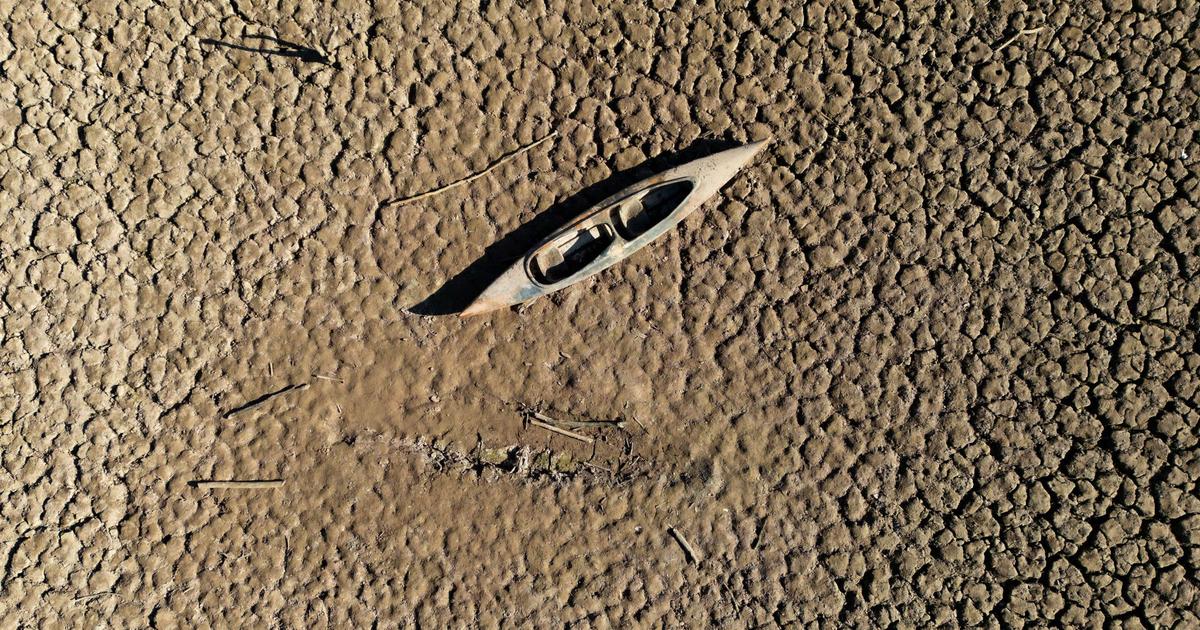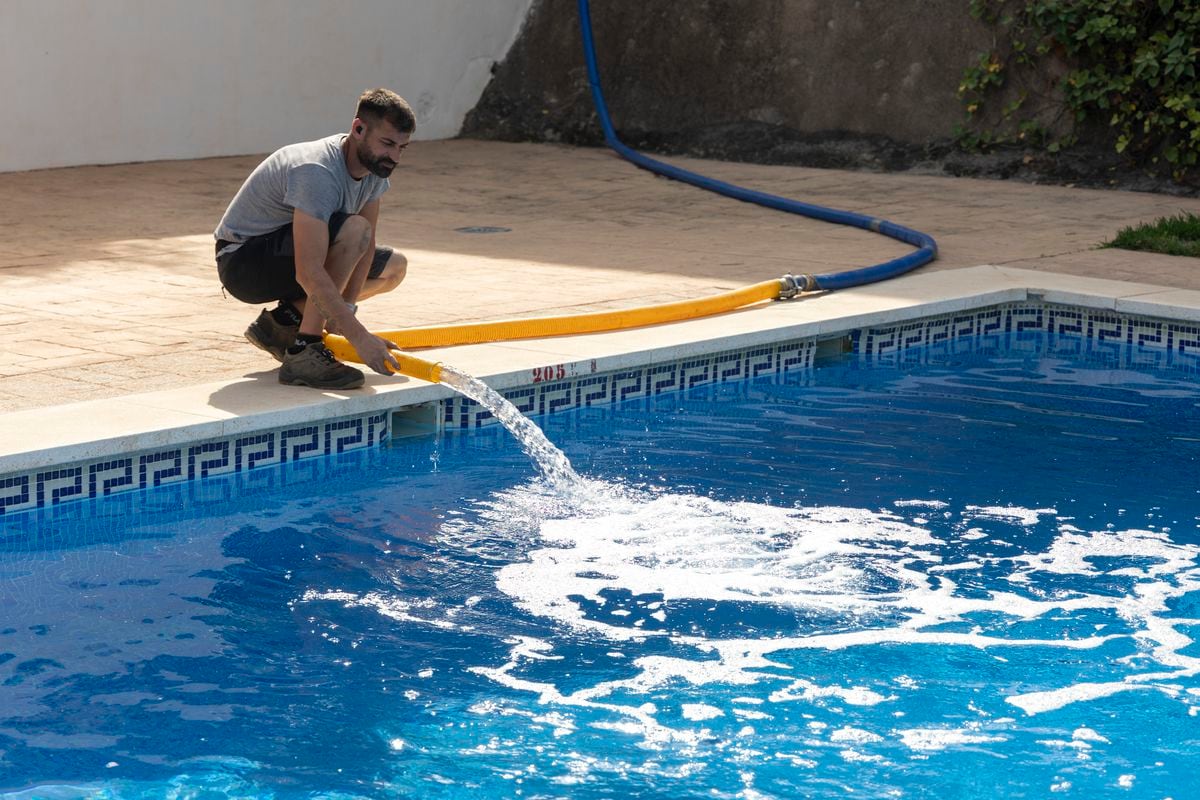The Generalitat has announced this Tuesday more severe water restrictions in 224 municipalities due to the severe drought, the longest period without rain since records exist (1905), and which has lasted for 30 months.
The decision to go to the next phase of alert (exceptionality) in the Ter-Llobregat system, which supplies Girona, Barcelona and its entire metropolitan area, among other municipalities, has been taken due to the scarcity of water in the internal basins (they are to 28% of its capacity).
With this new phase, around 6 million people will be prohibited from watering private and public gardens (until now they could only do it for two days), and restrictions on agricultural irrigation will increase from 25 to 40%, among other limitations.
Regarding domestic consumption, a maximum of 230 liters per inhabitant per day is established for water use at home (it is now 250), although in practice this limitation will hardly be noticeable in homes since the average daily consumption in the community is around 117 liters per day.
"In the face of an extremely serious situation, we must act accordingly", said the counselor Teresa Jordà.
If the drought entrenches for more months, the Government could resort to water cuts after the summer.
More information
The director of the Catalan Water Agency: "There may be water cuts in Barcelona at the end of 2023"
Catalonia thus enters an exceptional situation (the next phase is already the emergency phase, when water cuts are applied) for the first time since 2008, when a great drought forced even to bring water by boat to guarantee the supply of Barcelona.
The Minister of Climate Action of the Generalitat, Teresa Jordà, has also confirmed after the meeting of the Executive Council the emptying of the Sau reservoir, the second with the largest capacity in the internal basins, to transfer it to the Susqueda reservoir.
The reason is that Sau is so empty (at 15%) that its water quality is in danger of worsening due to contact with the sludge and complicating its purification.
Fish (mostly invasive species) also live in the swamp, which can die and rot.
The Government has also declared an alert in the Fluvià Muga aquifer,
Restrictions in a state of "exceptionality"
Irrigation reduction by 40% or replacement by reclaimed water (currently the limitation is 25%).
15% reduction in industrial water consumption (now it is at 5%).
Watering gardens and public and private green areas every day is prohibited.
Municipal street cleaning with potable water is prohibited.
Pools can only be partially filled with recirculation systems.
The others will not be able to be filled.
A maximum water use at home of 230 liters per inhabitant per day is established (now it is at 250).
If we take into account that the people of Barcelona consume 106 liters of water per day, according to data from the Barcelona City Council, this limitation will not be noticeable in homes.
Until late yesterday there was uncertainty within the Government about also declaring the phase of exceptionality in the Ter-Llobregat system.
The Government tries to maintain a balance so as not to affect economic activities too much while guaranteeing the supply: in this phase, industrial consumption for sectors such as stationery or metallurgy must be reduced by 15%.
The regional Executive has decided to advance the declaration to this March the phase, despite the fact that the reservoirs have not reached the 25% barrier, which marks the border of this new alert phase.
The director of the Catalan Water Agency, Samuel Reyes, already confirmed last week in an interview with this newspaper that, "at the latest", this phase would arrive next April.
"We are making progress [in the measures] to guarantee the supply to the population and the [economic] activities," Jordà has defended.
About how much it would have to rain to expel the ghost of the drought, Jordà said: "To give us an idea: 50 liters should fall every day for 4 months."
Reyes explained last week to this newspaper that the water cuts after the summer, when more water is consumed due to the irrigation season and it rains less, are already seen as a serious possibility as of September.
Climate change is taking its toll especially on the Mediterranean region, where experts have been warning for years that long periods of drought will be repeated more frequently.
Jordà has announced that the Generalitat will triple the investment to start up wells against the drought (from 800,000 euros to 2 million) to guarantee supply, above all to small municipalities disconnected from large hydrological infrastructures.
And aid for tanker trucks will be increased.
The Government has not detected a decrease in domestic consumption despite the fact that the majority of the population entered the first phase of alert now a year ago.
Far from it, Jordà has stated that consumption has increased by 3% in this period.
To deal with the situation, the Government has approved a specific decree law to facilitate urgent contracting in the event that domestic supply is endangered.
The current drought plan does not have the force of law (it is a Government agreement) and with this decree the Government seeks to shield its decision-making, sanctions and requirements to the municipalities.
The Government has approved a specific decree-law to facilitate urgent contracting in the event that domestic supply is endangered.
The current drought plan does not have the force of law (it is a Government agreement) and with this decree the Government seeks to shield its decision-making, sanctions and requirements to the municipalities.
The Government has approved a specific decree-law to facilitate urgent contracting in the event that domestic supply is endangered.
The current drought plan does not have the force of law (it is a Government agreement) and with this decree the Government seeks to shield its decision-making, sanctions and requirements to the municipalities.
The restrictions announced today for the population is a clear thermometer of the serious hydrological situation that the community is facing in the coming months, which despite developing a powerful hydrological plan based on desalination and regeneration of water during the tripartite Government (2003 -2006), this year sees serious supply problems.
Without this deployment of desalination plants and water reuse plants, the community would have applied water cutoffs by now.
By 2027, the Government wants to double the desalination and regeneration capacity to face a future without rain.
15 years have passed since the then Environment Minister, Francesc Baltasar, confessed that he had come to ask the Virgin of La
Moreneta
(venerated in the Monastery of Montserrat), to help him face the great drought of 2008. Now, the Government looks at the sky again imploring water.
The counselor has entrusted herself to the rains and has stated that the forecasts for this spring is that it will be "rainy".
"The [meteorological] models coincide in a rainy March, April and May (...), although this is changing day and day," Jordà said.
Although the prayers will not be the same: "We do not plan to have a procession in Montserrat...", Jordà said half jokingly in reference to the councilor Baltasar.
The situation in the Ebro Hydrographic Confederation in Catalonia, whose management depends on the Government of Spain, is also complicated, with its reserves below 30% of water.
Minister Jordà has criticized the management of this hydrological system and has accused the confederation of "not doing their homework".
"Her response from her [in the face of the drought situation] has been as frivolous as 'God will provide,'" Jordà accused.
"That they explain to us what measures they are going to adopt," she added.
Almost at the same time as the Catalan government's press conference, the president of the hydrographic agency, María Dolores Pascual, has announced that restrictions are planned in the area in the face of a "difficult" irrigation season.
You can follow EL PAÍS Catalunya on
and
, or sign up here to receive
our weekly newsletter


/cloudfront-eu-central-1.images.arcpublishing.com/prisa/R65LZW6EVZDNDFZPK25RWRQTVY.jpg)




/cloudfront-eu-central-1.images.arcpublishing.com/prisa/EZY3USHL75GFHJUQVOYWVDGKPM.jpg)

/cloudfront-eu-central-1.images.arcpublishing.com/prisa/YVHMWL7DMVBDDK33L37HIKIMP4.jpg)